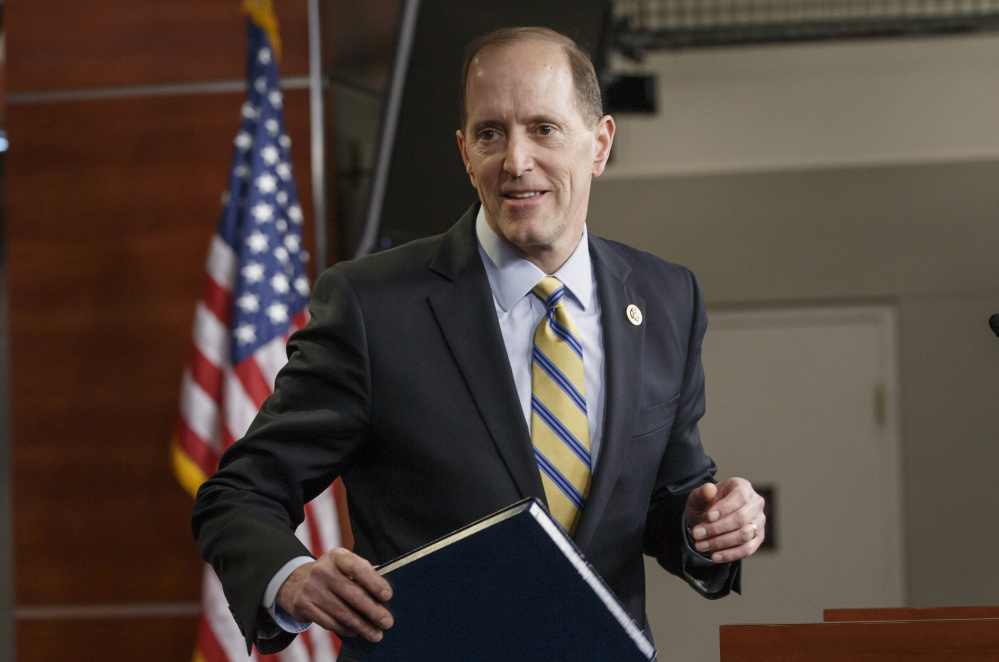WASHINGTON — The top Republican tax writer in Congress Wednesday proposed restructuring the U.S. tax code to eliminate dozens of breaks to pay for reductions in the corporate and individual rates.
The 979-page plan from Rep. Dave Camp would mark the biggest changes to the U.S. tax system since 1986, affecting every part of the U.S. economy.
The proposal includes new limits on breaks for health insurance, retirement savings and mortgage interest. The plan would repeal breaks for student loan interest, moving expenses, accelerated depreciation, and state and local taxes.
Corporations would have a top rate of 25 percent, down from 35 percent. Individuals would have a top rate of 25 percent, down from 39.6 percent. A 10 percent surtax would affect the very top earners, making their marginal rate higher.
The proposal would yield “a simpler, fairer tax code that leads to a stronger economy,” said Camp, a Michigan Republican and chairman of the House Ways and Means Committee.
Camp’s goal is to generate the same amount of revenue for the government and do so without reducing the tax burden for top earners.
His plan stands little chance of becoming law this year. Republican leaders are staying mum on the details and Democrats say the plan should increase revenue for the government. “We have an obligation to debate the big issues of the day,” Camp told reporters in unveiling the plan.
White House spokesman Josh Earnest praised Camp for proposing to reduce tax breaks that “the president has long advocated” curbing.
“There are a couple of reasons to be optimistic about it,” Earnest said, although he added, “There are some aspects of his proposal that we do not agree with.”
Sen. Charles Schumer of New York, a senior Democrat on the Finance Committee, called Camp’s plan “dead on arrival” because it would eliminate the state and local tax deduction, which is important to residents of high-tax states such as New York and California.
In releasing his plan in Washington, Camp provided the most complete picture yet of the trade-offs required to satisfy the rate-cut objective Republicans have set.
He proposed a 3.5 basis-point quarterly tax on assets of the biggest banks and insurers, and limits on the deductibility of entertainment, advertising and research expenses.
He proposed repealing the last-in, first-out accounting method used by many oil companies and wholesalers. Some breaks, such as the tax exemption for credit union income, were untouched.
U.S. multinational companies would have lighter taxes on their future profits earned outside the country. Under the plan, they would pay a one-time tax on assets they’ve accumulated outside the U.S. under the current system, with the proceeds dedicated to the Highway Trust Fund.
In response to concerns from companies including Corning and 3M, Camp created a two-tiered rate structure for the one-time tax. Cash and equivalents would face an 8.75 percent tax; other assets, such as the value of factories, would have a 3.5 percent rate.
Industry trade groups reacted swiftly in opposition to many of the specific provisions, arguing that they would be hurt or were singled out.
Jack Gerard, president of the American Petroleum Institute, said in a statement. “Tax reform is not easy to achieve. As this proposal illustrates, it is even harder to get right.”
Send questions/comments to the editors.



Success. Please wait for the page to reload. If the page does not reload within 5 seconds, please refresh the page.
Enter your email and password to access comments.
Hi, to comment on stories you must . This profile is in addition to your subscription and website login.
Already have a commenting profile? .
Invalid username/password.
Please check your email to confirm and complete your registration.
Only subscribers are eligible to post comments. Please subscribe or login first for digital access. Here’s why.
Use the form below to reset your password. When you've submitted your account email, we will send an email with a reset code.